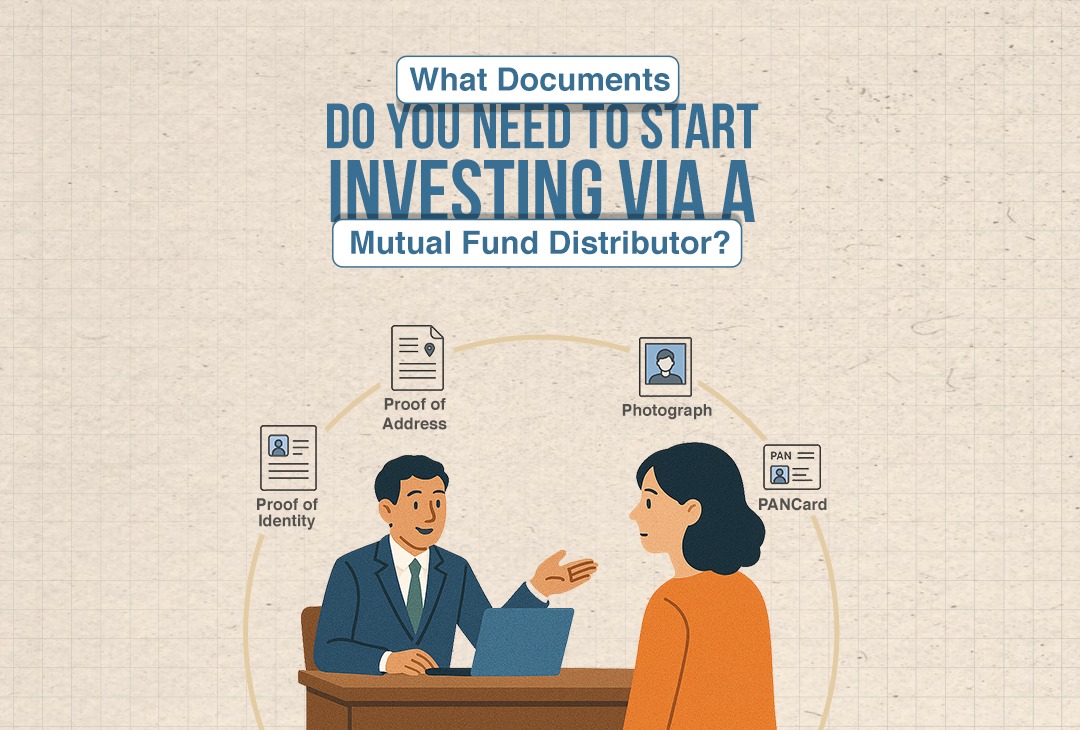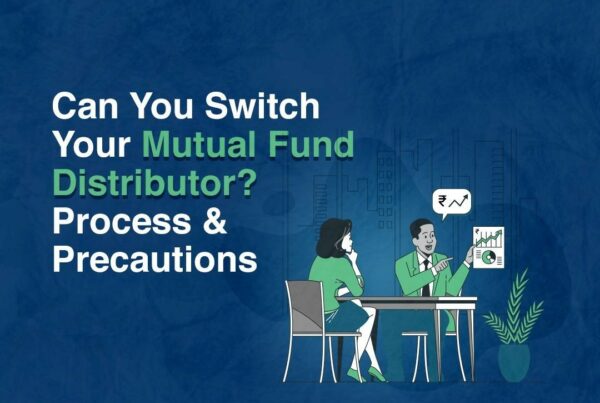What Documents Do You Need to Start Investing via a Mutual Fund Distributor?

Starting your mutual fund journey with a trusted distributor doesn’t just simplify the process it also helps you sidestep guesswork and headaches.
But even with top-tier guidance, one thing remains constant: you’ll still need a few essential documents in place before you can start investing.
Many first-time investors wonder if investing through a mutual fund distributor means extra paperwork or different documents compared to when you’re investing directly.
The simple answer? The documents remain the same.
But a good MFD makes it much easier by guiding you every step of the way, so you don’t have to handle it alone.
List of Documents Needed to Start Investing
Here’s what you should keep handy before you meet your mutual fund distributor:
1. PAN Card
Your PAN (Permanent Account Number) card is essential for investing in India. It connects your investments to your tax records and allows regulators to monitor your transactions.
However, if you’re making micro-investments (up to ₹50,000 per financial year), PAN isn’t mandatory – provided you furnish other valid ID proofs. Also, make sure your PAN is linked with Aadhaar as per regulatory requirements.
2. Proof of Identity (POI)
You’ll need to provide one valid ID proof that includes your photo and is issued by the central or state government. Commonly accepted documents include:
- Aadhaar
- Passport
- Voter ID
- Driving Licence
3. Proof of Address (POA)
Investors are expected to submit any valid document to confirm their current address. Any one of the following documents can be submitted as valid proof:
- Aadhaar Card
- Passport
- Voter ID
- Driving License
- Utility bill (not older than 3 months)
- Bank passbook or account statement with updated address (not older than 3 months)
- Registered rent agreement (if applicable)
4. Bank Account Details
A functional bank account is necessary for executing mutual fund transactions like SIPs, redemptions, and dividend payouts. The following documents are generally accepted:
- A cancelled cheque bearing your name
- Latest bank statement
- IFSC and MICR codes (needed for electronic transactions)
5. Photographs
You’ll also need to submit recent passport-size photographs. These are used as part of your identity verification by the mutual fund house.
6. FATCA Declaration
Under the Foreign Account Tax Compliance Act (FATCA), investors are required to declare their country of tax residence, whether in India or abroad.
Even if you are an Indian resident, you must confirm your tax residency status and provide:
- Country of tax residence
- Taxpayer Identification Number (TIN)
- Declaration confirming your residency status
7. Nominee Details
Adding a nominee ensures your mutual fund investments are transferred smoothly in case of an unforeseen event. Make sure to provide the nominee’s complete and accurate information, including:
- Full name
- Date of birth
- Contact number
- Address
- Relationship to the investor
If the nominee is a minor, you’ll also need to provide:
- Guardian’s full name and contact details
- Guardian’s relationship with the minor
In case the units are held jointly, all unit holders must jointly nominate a single person. The nominee will receive the rights to the units only if all joint holders pass away.
8. Investments in the Name of Minors
If you’re making investments on behalf of a minor (under age 18), the following documents are necessary:
- Minor’s Aadhaar or birth certificate
- PAN card of the guardian
- Document confirming relationship between guardian and minor
- KYC compliance of the guardian
9. Additional Documents for NRIs
Non-Resident Indians (NRIs) can invest in Indian mutual funds, subject to a few additional documentation requirements:
- A valid passport with visa
- Proof of overseas residential address
- Indian address proof (if available)
- FATCA declaration
10. For Corporates, Trusts, and Institutions
Entities like companies and trusts must submit specific organizational documents to invest:
- Memorandum and Articles of Association (MoA & AoA)
- Trust Deed (for trusts)
- Board Resolution authorizing investment
- Authorized signatories list
- KYC Documents for Authorised Signatories
KYC: What It Means and Why It Matters
KYC (Know Your Customer) is a mandatory process before you can invest in mutual funds.It’s a SEBI-mandated process to verify your identity and address- primarily to prevent misuse like fraud or money laundering.
Whether you’re investing directly or through a mutual fund distributor (MFD), completing your KYC is essential. You can do this through any of the three modes explained below.
1. Offline KYC
Your MFD will help you fill out the KYC form and submit it, along with your self-attested documents, to a Common Service Centre (CSC) linked to a KYC Registration Agency (KRA) such as
CSCs (Common Service Centres) are access points that provide a range of digital services including e-governance, education, healthcare, entertainment, and other government or private services, especially in rural and remote areas.
2. Online KYC
Many MFDs now offer a fully online KYC process. Your distributor will guide you through the KRA’s online portal. You’ll need to:
- Create an account on any KRA website that supports e-KYC.
- Fill out the KYC form.
- Upload scanned copies of your required documents.
- Complete a quick video-based identification.
3. Aadhaar-Based eKYC
Some MFDs and investment platforms also provide Aadhaar OTP-based eKYC. Just fill in the form, enter your Aadhaar details, and verify using the OTP sent to your linked mobile number. Your Aadhaar information will authenticate your identity in minutes.
This method comes with a cap – allowing investments of up to ₹50,000 annually per mutual fund house. If you want to invest more, you’ll need to go through an in-person verification (IPV).
How to Submit Each Document in Different KYC Modes
| Document | Offline KYC | Online KYC | Aadhaar-based eKYC |
| PAN Card | Self-attested photocopy + Original for verification | Scanned copy upload (PDF/JPEG) | Auto-fetched via Aadhaar if linked; else not required for micro-investments |
| Proof of Identity (POI) | Self-attested photocopy + Original for verification | Scanned copy upload | Verified via Aadhaar details |
| Proof of Address (POA) | Self-attested photocopy + Original for verification | Scanned copy upload | Aadhaar serves as POA |
| Bank Details (e.g. cheque/passbook) | Self-attested copy + Original if required | Scanned copy upload (cancelled cheque or statement) | May be fetched from Aadhaar-linked bank (not always) |
| Photographs | 1–2 Passport-sized photos (physical) | Digital photo upload | Not separately required (photo fetched from Aadhaar) |
| FATCA Declaration | Physical form signed by investor | Online form submission | Usually required separately |
| Nominee Details | Filled in nominee section of form + self-attested ID | Input online in KYC form | Input online or linked through Aadhaar OTP-based form |
| Minor/Guardian Documents | Self-attested copies + originals for verification | Scanned upload of all minor and guardian-related proofs | Aadhaar can be used for minor & guardian where applicable |
Practical Checklist Before Meeting Your MFD
- Keep two self-attested copies of each document
- Carry originals for verification (if needed)
- Make sure your address proof matches your current bank records
- Keep your registered mobile number active for OTPs
Save clear digital scans – they’ll speed up online KYC
Find a Certified MFD and Start Investing
Now you know exactly what documents you’ll need to start investing with a mutual fund distributor.
The next step is finding someone you trust.
When you have the right MFD by your side, you don’t have to figure out the paperwork and KYC alone. You get clear, step-by-step help to get it done right, without all the back-and-forth and stress.
And that’s where Moolaah comes in.
With so many investment scams out there today, it’s more important than ever to choose a verified, reliable MFD before you begin your mutual fund journey.
At Moolaah, we make that easy. Choose from a wide network of AMFI-registered Mutual Fund Distributors (MFDs), explore verified profiles, check their experience, and pick the one that best fits your investment needs.
Your distributor will help you handle the forms, submit the documents, and guide you through every step – so you can start investing smoothly and confidently.
Find a certified MFD, leave the paperwork worries behind, and begin your mutual fund journey with ease.
Note: If you’re investing online through a distributor, you’ll need to go through the KYC process and submit all required documents once. Once verified, the distributor can execute all your mutual fund investments across different fund houses via a single platform.
However, if you choose to work with another distributor whose platform is different, you may have to undergo the same KYC and documentation process again.
In case the distributor operates offline and invests directly through each fund house, the documentation burden increases. You may need to submit your KYC proof and related documents separately to each mutual fund company where investments are being made.
FAQ
Is the document process different when investing through an MFD vs. doing it on my own in mutual funds?
No, the documents required remain the same in both cases. However, an MFD can guide you through the process, help you avoid errors, and save time.
Do I need a PAN card to start investing in mutual funds?
Yes, PAN is mandatory for most investors. However, if you're investing up to ₹50,000 per year (micro-KYC), you can invest without PAN by submitting other valid ID proofs.
What documents can be used as valid Proof of Identity (POI) in mutual funds?
Commonly accepted POI documents include Aadhaar, Passport, Voter ID, and Driving Licence - any government-issued ID with a photo.
What counts as valid Proof of Address (POA) in mutual funds?
Aadhaar, Passport, Driving Licence, Voter ID, utility bills (less than 3 months old), and bank statements with your current address (not older than 3 months), Registered rent agreement (if applicable).
Do I need to update KYC if I change my address or name in mutual funds?
Yes, any change in your personal details (like address, name, or contact info) must be updated by submitting the relevant proof along with a KYC update form.
What nominee details are required while starting an investment in mutual funds?
FATCA (Foreign Account Tax Compliance Act) declaration is mandatory for all mutual fund investors—whether you are a tax resident of India or another country.
You must declare your country of tax residence and provide the necessary details, such as your Taxpayer Identification Number (TIN), if applicable, along with a declaration confirming your residency status.
This process helps ensure compliance with global tax reporting regulations.
Do I need to update KYC if I change my address or name in mutual funds?
You must provide the nominee’s full name, DOB, address, contact details, and relationship to you. If the nominee is a minor, guardian details are also needed.
What documents are required for investing in the name of a minor in mutual funds?
You’ll need the minor’s Aadhaar or birth certificate, the guardian’s PAN, a document confirming the relationship, and the guardian’s KYC.
I'm an NRI. What extra documents do I need in mutual funds?
NRIs need to provide a valid passport with visa, overseas address proof, an Indian address proof (if available), and FATCA declaration.
What documents are required for corporate or institutional investments in mutual funds?
Entities must submit the Memorandum & Articles of Association, Trust Deed (if applicable), board resolution for investment, list of authorized signatories, and KYC for each authorized signatory.



